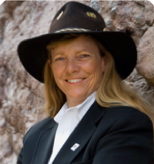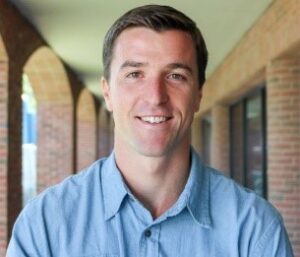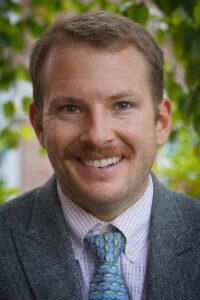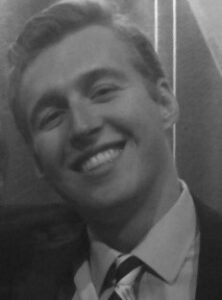This post was written by Henry Vogt ’19
“Hunter is disruptive” is the phrase we first saw as we walked into our second guest lecturer of the semester.
 Earlier this Fall we had the pleasure of hosting guest speaker Hunter Lovins. Suffice it to say, she knocked our socks off. I had heard Hunter’s name before, but wasn’t very familiar with her work or legacy. It became apparent right away that we were in for a unique and inspiring experience.
Earlier this Fall we had the pleasure of hosting guest speaker Hunter Lovins. Suffice it to say, she knocked our socks off. I had heard Hunter’s name before, but wasn’t very familiar with her work or legacy. It became apparent right away that we were in for a unique and inspiring experience.
Hunter’s body of work in sustainability and climate justice is prolific: from starting numerous influential non-profits, creating successful sustainable MBA programs from scratch, authoring best selling books, founding impact investing firms, and consulting with some of the largest corporations in the world including Unilever and Walmart, Hunter’s influence is extensive. This is augmented by her down-to-earth, Colorado ranch-style demeanor. She tells it like it is, passionately, in an inspirational way. She’s the type of person that understands that solving world problems is best facilitated over a whiskey, face-to-face. Hunter also owns a beautiful ranch in Colorado, where she easily could spend all of her time but instead chooses to be on the move, committed to her mission.
I asked Hunter how she envisions American capitalism evolving and whether she believes it has the capacity to solve the massive challenges facing our planet under current frameworks. She answered by giving a prediction from economist Tony Sebens: “Within 10 years, economics will dictate that the world will be 100 percent renewable. For this to happen, the world’s economy will be disrupted. This will be the ‘Mother of all disruptions.’ In other words, to save the climate we have to crash the global economy.”
If this is, in fact, the case, then the next decade will be tumultuous to say the least. This led our class session to focus on the question of what’s next and how do we collectively begin to prepare for this disruption. While this notion and idea can admittedly be not very uplifting, it was encouraging to hear suggestions from many of my classmates on how we may leverage our global economy and invest in Base of the Pyramid projects to find solutions and begin to strategize on how we may “soften the landing” from major global disruption.
Overall, having Hunter present to us was inspiring and eye-opening. While there are massive challenges ahead, having individuals like Hunter who are disruptive, driven, and committed to finding solutions to these challenges provides hope for the future.

 I wanted to continue working in a field that made a positive impact in our communities and on the world in general and felt the the private sector was the right place to move into, but I wanted — and needed — to expand my professional toolkit first.
I wanted to continue working in a field that made a positive impact in our communities and on the world in general and felt the the private sector was the right place to move into, but I wanted — and needed — to expand my professional toolkit first. Many of UVM’s 13 colleges and schools are at the forefront in their respective fields of research. In 2016, UVM received
Many of UVM’s 13 colleges and schools are at the forefront in their respective fields of research. In 2016, UVM received  “The pressure was on, it was mid-July and I did not have an apartment yet for the upcoming school year. Do I try to find someone looking for a roommate? Get an apartment then try to find a roommate? Or do I just find a one-bedroom apartment? Where do I try to live? Should I get a pet-friendly apartment so my dog can come up and visit?
“The pressure was on, it was mid-July and I did not have an apartment yet for the upcoming school year. Do I try to find someone looking for a roommate? Get an apartment then try to find a roommate? Or do I just find a one-bedroom apartment? Where do I try to live? Should I get a pet-friendly apartment so my dog can come up and visit?  “
“ I chose this program for its welcoming, collaborative environment and because I wanted learn the questions to ask and tools to use to make business better. I also love knowing that I will be back out in the world in less than a year, better equipped to make a difference!
I chose this program for its welcoming, collaborative environment and because I wanted learn the questions to ask and tools to use to make business better. I also love knowing that I will be back out in the world in less than a year, better equipped to make a difference! Despite these amazing numbers, almost everyone has experienced a time when our brain seems small; incapable of remembering simple things, and incapable of performing simple tasks. This happens to almost everyone, including the brilliant minds of UVM’s Sustainable Innovation MBA students.
Despite these amazing numbers, almost everyone has experienced a time when our brain seems small; incapable of remembering simple things, and incapable of performing simple tasks. This happens to almost everyone, including the brilliant minds of UVM’s Sustainable Innovation MBA students. Excerpt:
Excerpt:
 On Friday, November 30th it finally clicked. I need to stick to a standard 9-to-5 work schedule in order properly manage my time. Steve Gagner, the co-founder of 14th Star Brewery spoke to our Family Business class and told us there’s no such thing as not enough time in the day, just poor time management skills. Even though we have over 20 credits of classes, that’s only 20 hours a week spent in class. The rest of the 40 hours allocated for a standard work schedule can be spent studying, reading and completing assignments. Since the majority of our classes take place between 9 a.m. and 5 p.m., the time not spent in class can be used for completing classwork. That still allows me before 9 a.m. and after 5 p.m. to accomplish my personal daily goals. It wasn’t until Steve framed it in this way that it finally clicked.
On Friday, November 30th it finally clicked. I need to stick to a standard 9-to-5 work schedule in order properly manage my time. Steve Gagner, the co-founder of 14th Star Brewery spoke to our Family Business class and told us there’s no such thing as not enough time in the day, just poor time management skills. Even though we have over 20 credits of classes, that’s only 20 hours a week spent in class. The rest of the 40 hours allocated for a standard work schedule can be spent studying, reading and completing assignments. Since the majority of our classes take place between 9 a.m. and 5 p.m., the time not spent in class can be used for completing classwork. That still allows me before 9 a.m. and after 5 p.m. to accomplish my personal daily goals. It wasn’t until Steve framed it in this way that it finally clicked.